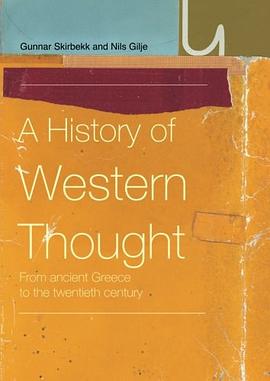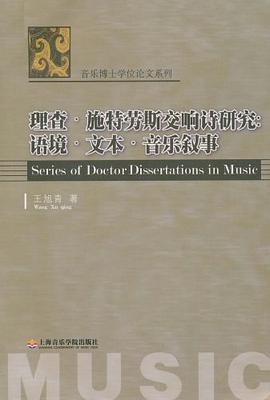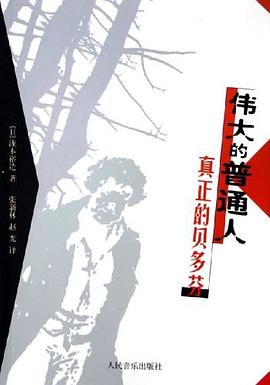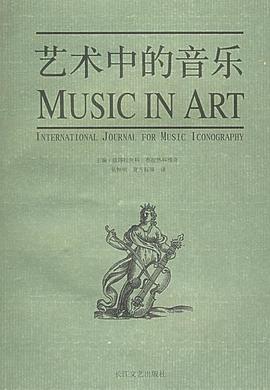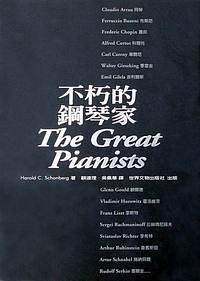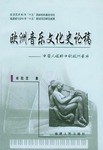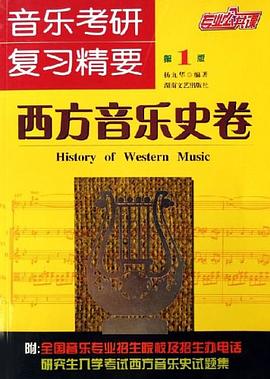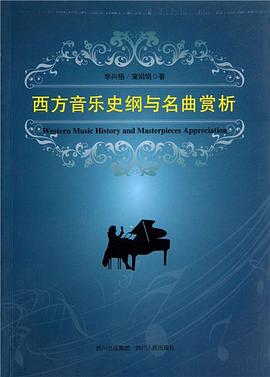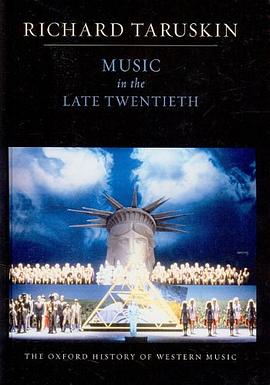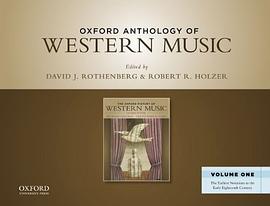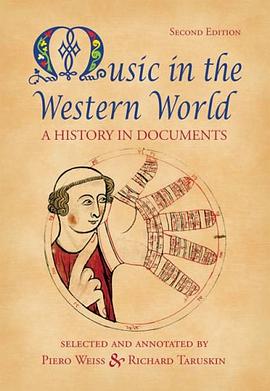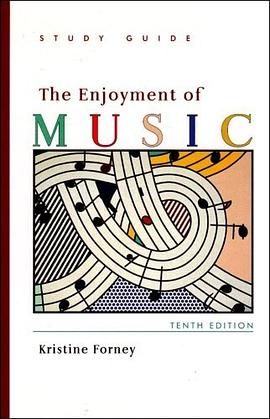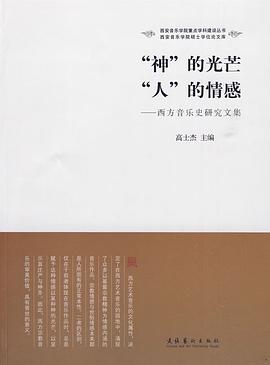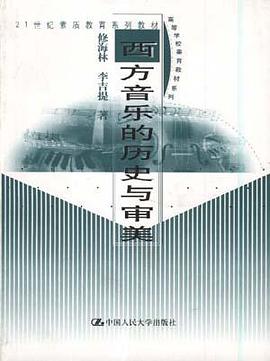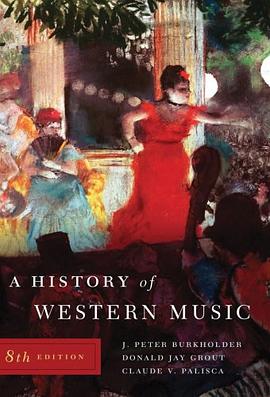

The Eighth Edition of A History of Western Music is a vivid, accessible, and richly contextual view of music in Western culture. Building on his monumental revision of the Seventh Edition, Peter Burkholder has refined an inspired narrative for a new generation of students, placing people at the center of the story. The narrative of A History of Western Music naturally focuses on the musical works, styles, genres, and ideas that have proven most influential, enduring, and significant—but it also encompasses a wide range of music, from religious to secular, from serious to humorous, from art music to popular music, and from Europe to the Americas. With a six-part structure emphasizing the music’s reception and continued influence, Burkholder’s narrative establishes a social and historical context for each repertoire to reveal its legacy and its significance today.
具體描述
讀後感
ps:读的是 A history of Western Music (sixth edition),中英文版同时进行的。英文版的有些晕,知识点也记得不是很清晰;中文版的扫读很快,为获得知识而阅读。 这一次是从后往前读的。一直觉得自己对20世纪之后的音乐掌握的不好,主观客观都有原因。 在面对诸多只见其名...
評分ps:读的是 A history of Western Music (sixth edition),中英文版同时进行的。英文版的有些晕,知识点也记得不是很清晰;中文版的扫读很快,为获得知识而阅读。 这一次是从后往前读的。一直觉得自己对20世纪之后的音乐掌握的不好,主观客观都有原因。 在面对诸多只见其名...
評分ps:读的是 A history of Western Music (sixth edition),中英文版同时进行的。英文版的有些晕,知识点也记得不是很清晰;中文版的扫读很快,为获得知识而阅读。 这一次是从后往前读的。一直觉得自己对20世纪之后的音乐掌握的不好,主观客观都有原因。 在面对诸多只见其名...
評分这是一本相当专业的音乐史巨著,相比朗多米尔的《西方音乐史》而言,本书篇幅更大,内容更加专业,视角也更加可观。另外可以用保罗亨利朗格的《西方文明中的音乐》一书与本书做对比,同样作为音乐史学的著作,显然朗格是站在整个文明的立场上,文明是全书的主线,而音乐...
評分这是一本相当专业的音乐史巨著,相比朗多米尔的《西方音乐史》而言,本书篇幅更大,内容更加专业,视角也更加可观。另外可以用保罗亨利朗格的《西方文明中的音乐》一书与本书做对比,同样作为音乐史学的著作,显然朗格是站在整个文明的立场上,文明是全书的主线,而音乐...
用戶評價
兩天內賣齣的第二本書。不大願賣。不少有意思的段落和筆記,部分如下。學到1750,期末論文關於巴赫《賦格的藝術》。關注:古希臘音樂理論的發展和復興; M.L.West。 p.316 It is sometimes not the originator of an idea, but the first person to show its full potential, who gives it a permanent place in human history. So it appears with opera, whose first widely renowned composer was not Peri or Caccini but Claudio Monteverdi. (原評*:originator 無尋; recognition) p.310 ...opera might never have emerged without the interest of humanist scholars, poets, musicians, and patrons in reviving Greek tragedy. They hoped to generate the ethical effects of ancient music in Greece by creating modern works with equal emotional power...In this sense, opera fulfilled a profoundly humanist agenda, a parallel in dramatic music to the emulation of ancient Greek sculpture and architecture. Renaissance scholars disagreed among themselves about the role of music in ancient tragedy...After reading in Greek almost every ancient work on music that survived, he (Girolamo Mei, 1519-1594) concluded that Greek music consisted of a single melody, sung by a soloist or chorus, with or without accompaniment. This melody could evoke powerful emotional effects in the listener through the natural expressiveness of vocal registers, rising and falling pitch, and changing rhythms and tempo. p.39 Boethius (ca.480-ca.524) was the most revered authority on music in the Middle Ages...Music for Boethius is a science of numbers, and numerical ratios and proportions determine intervals, consonances, scales and tuning. Boethius compiled the book from Greek sources, mainly a lost treatise by Nicomachus and the first book of Ptolemy's Harmonics...(Figure 2.10) the three types of music Boethius described: at the top, musica mundana, the mathematical order of the universe; in the middle, musica humana, the harmony of the human body and soul; and on the bottom, musica instrumentalis, audible music (Lebrecht Music & Arts)...Boethius emphasized the influence of music on character...He valued music primarily as an object of knowledge, not a practical pursuit. For him music was the study of high and low sounds by means of reason and the senses; the philosopher who used reason to make judgments about music was the true musician, not the singer or someone who made up songs by instinct. p.10-11 The aulos was a pipe typically played in pairs...used in the worship of Dionysus, god of fertility and wine; Lyres usually had seven strings and were strummed with a plectrum, or pick...The lyre was associated with Apollo; The kithara was a large lyre, used especially for processions and sacred ceremonies and in the theater... the Greeks, despite having a well-developed form of notation by the fourth century B.C.E., primarily learned music by ear; they played and sang from memory or improvised using conventions and formulas. p.12 From the sixth century B.C.E. or earlier, the aulos and kithara were played as solo instruments. Sakadas of Argos won the prize for aulos playing at the Pythian Games...performing the Pythic Nomos, a virtuoso composition portraying Apollo's victory over the serpent Python; one writer attributes the piece to Sakadas, making him the earliest composer of instrumental music whose name we know. (Figure 1.9: Kitharode singing to his own accompaniment on the kithara, with his head tilted back: *遷:常給神?或顯盲彈) p.12 There were two principal kinds of writings on music: (1) philosophical doctrines on the nature of music, its effects, and its proper uses [most influential: by Plato in his Republic and Timaeus and by Aristotle in his Politics]; and (2) systematic descriptions of the materials of music, what we now call music theory [evolved continually from the time of its founder, Pythagoras, to Aristides Quintilianus, its last important writer]. p.13 Music as a performing art was called melos...Melos could denote an instrumental melody alone or a song with text, and "perfect melos" was melody, text, and stylized dance movement conceived as a whole. For the Greeks, music and poetry were nearly synonymous..."Lyric" poetry meant poetry sung to the lyre; "tragedy" incorporates the noun ode, "the art of singing." (*: spatial-temporal) p.13 For Pythagoras and his followers, numbers were the key to the universe, and music was inseparable from numbers. Rhythms were ordered by numbers, because each note was some multiple of a primary duration. Pythagoras was credited with discovering that the octave, fifth, and fourth, long recognized as consonances, are also related to numbers. These intervals are generated by the simplest possible ratio: for example, when a string is divided, segments whose lengths are in the ratio 2:1 sound an octave, 3:2 a fifth, and 4:3 a fourth. p.13 Because musical sounds and rhythms were ordered by numbers, they were thought to exemplify the general concept of harmonia, the unification of parts in an orderly whole...Greek writers perceived music as a reflection of the order of the universe. p.13-14 Greek writers believed that music could affect ethos, one's ethical character of way of being and behaving...Through the doctrine of imitation outlined in his Politics, Aristotle described how music affected behavior: music that imitated a certain ethos aroused that ethos in the listener. The imitation of an ethos was accomplished partly through the choice of harmonia, in the sense of a scale type or style of melody. p.14-15 Plato and Aristotle both argued that education should stress gymnastics (to discipline the body) and music (to discipline the mind). In his Republic, Plato insisted that the two must be balanced, because too much music made one weak and irritable while too much gymnastics made one uncivilized, violent, and ignorant. Only certain music was suitable, since habitual listening to music that roused ignoble states of mind distorted a person's character. Those being trained to govern should avoid melodies expressing softness and indolence. Plato endorsed two harmoniai--the Dorian and Phrygian, because they fostered temperance and courage--and excluded others...Aristotle, in his Politics, was less restrictive than Plato. He held that music could be used for enjoyment as well as education and that negative emotions such as pity and fear could be purged by inducing them through music and drama. However, he felt that sons of free citizens should not seek professional training or instruments or aspire to the virtuosity shown by performers in competitions since it was menial and vulgar to play solely for the pleasure of others rather than for one's own improvement. p.9 India and China developed independently from Mesopotamia and were probably too distant to affect Greek or European music. Surviving sources that shed light on Egyptian musical traditions are especially rich...Archaeological remains and images that relate to music are relatively scant for ancient Israel, but music in religious observances is described in the Bible.
评分兩天內賣齣的第二本書。不大願賣。不少有意思的段落和筆記,部分如下。學到1750,期末論文關於巴赫《賦格的藝術》。關注:古希臘音樂理論的發展和復興; M.L.West。 p.316 It is sometimes not the originator of an idea, but the first person to show its full potential, who gives it a permanent place in human history. So it appears with opera, whose first widely renowned composer was not Peri or Caccini but Claudio Monteverdi. (原評*:originator 無尋; recognition) p.310 ...opera might never have emerged without the interest of humanist scholars, poets, musicians, and patrons in reviving Greek tragedy. They hoped to generate the ethical effects of ancient music in Greece by creating modern works with equal emotional power...In this sense, opera fulfilled a profoundly humanist agenda, a parallel in dramatic music to the emulation of ancient Greek sculpture and architecture. Renaissance scholars disagreed among themselves about the role of music in ancient tragedy...After reading in Greek almost every ancient work on music that survived, he (Girolamo Mei, 1519-1594) concluded that Greek music consisted of a single melody, sung by a soloist or chorus, with or without accompaniment. This melody could evoke powerful emotional effects in the listener through the natural expressiveness of vocal registers, rising and falling pitch, and changing rhythms and tempo. p.39 Boethius (ca.480-ca.524) was the most revered authority on music in the Middle Ages...Music for Boethius is a science of numbers, and numerical ratios and proportions determine intervals, consonances, scales and tuning. Boethius compiled the book from Greek sources, mainly a lost treatise by Nicomachus and the first book of Ptolemy's Harmonics...(Figure 2.10) the three types of music Boethius described: at the top, musica mundana, the mathematical order of the universe; in the middle, musica humana, the harmony of the human body and soul; and on the bottom, musica instrumentalis, audible music (Lebrecht Music & Arts)...Boethius emphasized the influence of music on character...He valued music primarily as an object of knowledge, not a practical pursuit. For him music was the study of high and low sounds by means of reason and the senses; the philosopher who used reason to make judgments about music was the true musician, not the singer or someone who made up songs by instinct. p.10-11 The aulos was a pipe typically played in pairs...used in the worship of Dionysus, god of fertility and wine; Lyres usually had seven strings and were strummed with a plectrum, or pick...The lyre was associated with Apollo; The kithara was a large lyre, used especially for processions and sacred ceremonies and in the theater... the Greeks, despite having a well-developed form of notation by the fourth century B.C.E., primarily learned music by ear; they played and sang from memory or improvised using conventions and formulas. p.12 From the sixth century B.C.E. or earlier, the aulos and kithara were played as solo instruments. Sakadas of Argos won the prize for aulos playing at the Pythian Games...performing the Pythic Nomos, a virtuoso composition portraying Apollo's victory over the serpent Python; one writer attributes the piece to Sakadas, making him the earliest composer of instrumental music whose name we know. (Figure 1.9: Kitharode singing to his own accompaniment on the kithara, with his head tilted back: *遷:常給神?或顯盲彈) p.12 There were two principal kinds of writings on music: (1) philosophical doctrines on the nature of music, its effects, and its proper uses [most influential: by Plato in his Republic and Timaeus and by Aristotle in his Politics]; and (2) systematic descriptions of the materials of music, what we now call music theory [evolved continually from the time of its founder, Pythagoras, to Aristides Quintilianus, its last important writer]. p.13 Music as a performing art was called melos...Melos could denote an instrumental melody alone or a song with text, and "perfect melos" was melody, text, and stylized dance movement conceived as a whole. For the Greeks, music and poetry were nearly synonymous..."Lyric" poetry meant poetry sung to the lyre; "tragedy" incorporates the noun ode, "the art of singing." (*: spatial-temporal) p.13 For Pythagoras and his followers, numbers were the key to the universe, and music was inseparable from numbers. Rhythms were ordered by numbers, because each note was some multiple of a primary duration. Pythagoras was credited with discovering that the octave, fifth, and fourth, long recognized as consonances, are also related to numbers. These intervals are generated by the simplest possible ratio: for example, when a string is divided, segments whose lengths are in the ratio 2:1 sound an octave, 3:2 a fifth, and 4:3 a fourth. p.13 Because musical sounds and rhythms were ordered by numbers, they were thought to exemplify the general concept of harmonia, the unification of parts in an orderly whole...Greek writers perceived music as a reflection of the order of the universe. p.13-14 Greek writers believed that music could affect ethos, one's ethical character of way of being and behaving...Through the doctrine of imitation outlined in his Politics, Aristotle described how music affected behavior: music that imitated a certain ethos aroused that ethos in the listener. The imitation of an ethos was accomplished partly through the choice of harmonia, in the sense of a scale type or style of melody. p.14-15 Plato and Aristotle both argued that education should stress gymnastics (to discipline the body) and music (to discipline the mind). In his Republic, Plato insisted that the two must be balanced, because too much music made one weak and irritable while too much gymnastics made one uncivilized, violent, and ignorant. Only certain music was suitable, since habitual listening to music that roused ignoble states of mind distorted a person's character. Those being trained to govern should avoid melodies expressing softness and indolence. Plato endorsed two harmoniai--the Dorian and Phrygian, because they fostered temperance and courage--and excluded others...Aristotle, in his Politics, was less restrictive than Plato. He held that music could be used for enjoyment as well as education and that negative emotions such as pity and fear could be purged by inducing them through music and drama. However, he felt that sons of free citizens should not seek professional training or instruments or aspire to the virtuosity shown by performers in competitions since it was menial and vulgar to play solely for the pleasure of others rather than for one's own improvement. p.9 India and China developed independently from Mesopotamia and were probably too distant to affect Greek or European music. Surviving sources that shed light on Egyptian musical traditions are especially rich...Archaeological remains and images that relate to music are relatively scant for ancient Israel, but music in religious observances is described in the Bible.
评分除瞭太貴瞭點。。內容還是不錯的
评分很全的音樂史
评分兩天內賣齣的第二本書。不大願賣。不少有意思的段落和筆記,部分如下。學到1750,期末論文關於巴赫《賦格的藝術》。關注:古希臘音樂理論的發展和復興; M.L.West。 p.316 It is sometimes not the originator of an idea, but the first person to show its full potential, who gives it a permanent place in human history. So it appears with opera, whose first widely renowned composer was not Peri or Caccini but Claudio Monteverdi. (原評*:originator 無尋; recognition) p.310 ...opera might never have emerged without the interest of humanist scholars, poets, musicians, and patrons in reviving Greek tragedy. They hoped to generate the ethical effects of ancient music in Greece by creating modern works with equal emotional power...In this sense, opera fulfilled a profoundly humanist agenda, a parallel in dramatic music to the emulation of ancient Greek sculpture and architecture. Renaissance scholars disagreed among themselves about the role of music in ancient tragedy...After reading in Greek almost every ancient work on music that survived, he (Girolamo Mei, 1519-1594) concluded that Greek music consisted of a single melody, sung by a soloist or chorus, with or without accompaniment. This melody could evoke powerful emotional effects in the listener through the natural expressiveness of vocal registers, rising and falling pitch, and changing rhythms and tempo. p.39 Boethius (ca.480-ca.524) was the most revered authority on music in the Middle Ages...Music for Boethius is a science of numbers, and numerical ratios and proportions determine intervals, consonances, scales and tuning. Boethius compiled the book from Greek sources, mainly a lost treatise by Nicomachus and the first book of Ptolemy's Harmonics...(Figure 2.10) the three types of music Boethius described: at the top, musica mundana, the mathematical order of the universe; in the middle, musica humana, the harmony of the human body and soul; and on the bottom, musica instrumentalis, audible music (Lebrecht Music & Arts)...Boethius emphasized the influence of music on character...He valued music primarily as an object of knowledge, not a practical pursuit. For him music was the study of high and low sounds by means of reason and the senses; the philosopher who used reason to make judgments about music was the true musician, not the singer or someone who made up songs by instinct. p.10-11 The aulos was a pipe typically played in pairs...used in the worship of Dionysus, god of fertility and wine; Lyres usually had seven strings and were strummed with a plectrum, or pick...The lyre was associated with Apollo; The kithara was a large lyre, used especially for processions and sacred ceremonies and in the theater... the Greeks, despite having a well-developed form of notation by the fourth century B.C.E., primarily learned music by ear; they played and sang from memory or improvised using conventions and formulas. p.12 From the sixth century B.C.E. or earlier, the aulos and kithara were played as solo instruments. Sakadas of Argos won the prize for aulos playing at the Pythian Games...performing the Pythic Nomos, a virtuoso composition portraying Apollo's victory over the serpent Python; one writer attributes the piece to Sakadas, making him the earliest composer of instrumental music whose name we know. (Figure 1.9: Kitharode singing to his own accompaniment on the kithara, with his head tilted back: *遷:常給神?或顯盲彈) p.12 There were two principal kinds of writings on music: (1) philosophical doctrines on the nature of music, its effects, and its proper uses [most influential: by Plato in his Republic and Timaeus and by Aristotle in his Politics]; and (2) systematic descriptions of the materials of music, what we now call music theory [evolved continually from the time of its founder, Pythagoras, to Aristides Quintilianus, its last important writer]. p.13 Music as a performing art was called melos...Melos could denote an instrumental melody alone or a song with text, and "perfect melos" was melody, text, and stylized dance movement conceived as a whole. For the Greeks, music and poetry were nearly synonymous..."Lyric" poetry meant poetry sung to the lyre; "tragedy" incorporates the noun ode, "the art of singing." (*: spatial-temporal) p.13 For Pythagoras and his followers, numbers were the key to the universe, and music was inseparable from numbers. Rhythms were ordered by numbers, because each note was some multiple of a primary duration. Pythagoras was credited with discovering that the octave, fifth, and fourth, long recognized as consonances, are also related to numbers. These intervals are generated by the simplest possible ratio: for example, when a string is divided, segments whose lengths are in the ratio 2:1 sound an octave, 3:2 a fifth, and 4:3 a fourth. p.13 Because musical sounds and rhythms were ordered by numbers, they were thought to exemplify the general concept of harmonia, the unification of parts in an orderly whole...Greek writers perceived music as a reflection of the order of the universe. p.13-14 Greek writers believed that music could affect ethos, one's ethical character of way of being and behaving...Through the doctrine of imitation outlined in his Politics, Aristotle described how music affected behavior: music that imitated a certain ethos aroused that ethos in the listener. The imitation of an ethos was accomplished partly through the choice of harmonia, in the sense of a scale type or style of melody. p.14-15 Plato and Aristotle both argued that education should stress gymnastics (to discipline the body) and music (to discipline the mind). In his Republic, Plato insisted that the two must be balanced, because too much music made one weak and irritable while too much gymnastics made one uncivilized, violent, and ignorant. Only certain music was suitable, since habitual listening to music that roused ignoble states of mind distorted a person's character. Those being trained to govern should avoid melodies expressing softness and indolence. Plato endorsed two harmoniai--the Dorian and Phrygian, because they fostered temperance and courage--and excluded others...Aristotle, in his Politics, was less restrictive than Plato. He held that music could be used for enjoyment as well as education and that negative emotions such as pity and fear could be purged by inducing them through music and drama. However, he felt that sons of free citizens should not seek professional training or instruments or aspire to the virtuosity shown by performers in competitions since it was menial and vulgar to play solely for the pleasure of others rather than for one's own improvement. p.9 India and China developed independently from Mesopotamia and were probably too distant to affect Greek or European music. Surviving sources that shed light on Egyptian musical traditions are especially rich...Archaeological remains and images that relate to music are relatively scant for ancient Israel, but music in religious observances is described in the Bible.
相關圖書
本站所有內容均為互聯網搜索引擎提供的公開搜索信息,本站不存儲任何數據與內容,任何內容與數據均與本站無關,如有需要請聯繫相關搜索引擎包括但不限於百度,google,bing,sogou 等
© 2025 qciss.net All Rights Reserved. 小哈圖書下載中心 版权所有


